 Petzlover
Petzlover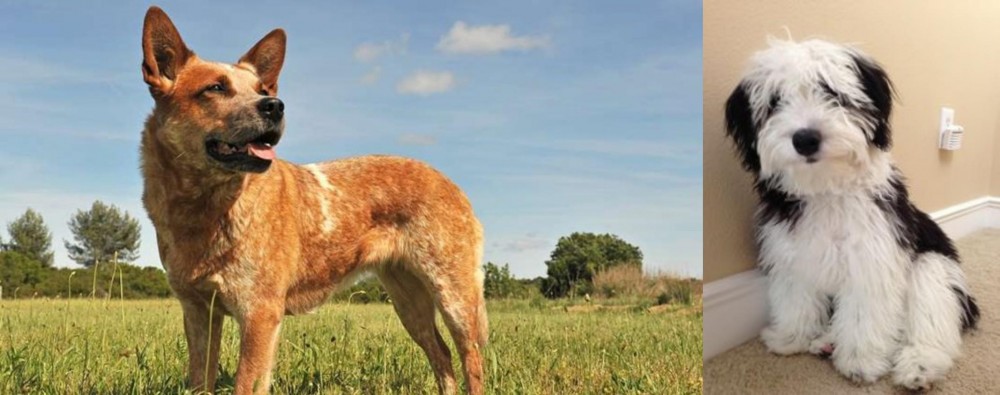 Australian Red Heeler is originated from Australia but Mini Sheepadoodles is originated from United States. Both Australian Red Heeler and Mini Sheepadoodles are having almost same height. Both Australian Red Heeler and Mini Sheepadoodles are having almost same weight. Both Australian Red Heeler and Mini Sheepadoodles has same life span. Both Australian Red Heeler and Mini Sheepadoodles has almost same litter size. Both Australian Red Heeler and Mini Sheepadoodles requires Moderate Maintenance.
Australian Red Heeler is originated from Australia but Mini Sheepadoodles is originated from United States. Both Australian Red Heeler and Mini Sheepadoodles are having almost same height. Both Australian Red Heeler and Mini Sheepadoodles are having almost same weight. Both Australian Red Heeler and Mini Sheepadoodles has same life span. Both Australian Red Heeler and Mini Sheepadoodles has almost same litter size. Both Australian Red Heeler and Mini Sheepadoodles requires Moderate Maintenance.
 When George Hall arrived in the New South Wales Colony in 1802 he set about ‘creating’ a tough working- or herding dog. By crossing Australia’s native Dingoes with Collies as well as with other herding dogs, the robust Red Heeler, also known as the Australian Cattle Dog came into being. Today he is a thick-set dog, ideally suited to working livestock.
When George Hall arrived in the New South Wales Colony in 1802 he set about ‘creating’ a tough working- or herding dog. By crossing Australia’s native Dingoes with Collies as well as with other herding dogs, the robust Red Heeler, also known as the Australian Cattle Dog came into being. Today he is a thick-set dog, ideally suited to working livestock.
Ranchers, particularly, were impressed with the breed’s toughness and they were sought after on cattle stations. The name actually comes from them when the dogs are herding animals, they nip at their heels to get them moving.
The Blue Heeler and the Red Heeler breed are the exact same dog, but just different colors. These Australian cattle dogs originated in Australia in the mid-1800s and adapted well to the harsh desert environment of the outback.
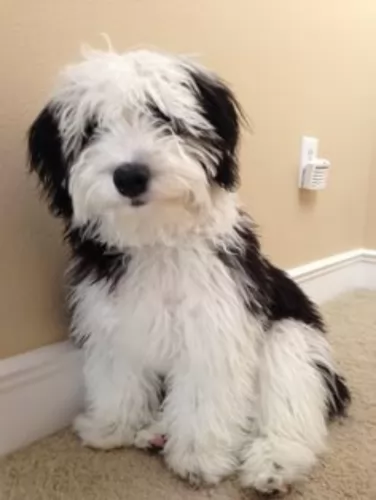 The Mini Sheepadoodle is such a sweet, teddy bear of a dog. It comes from two awesome dog breeds – the Old English Sheepdog and the Miniature Poodle. It is thought that the dog originated in the USA.
The Mini Sheepadoodle is such a sweet, teddy bear of a dog. It comes from two awesome dog breeds – the Old English Sheepdog and the Miniature Poodle. It is thought that the dog originated in the USA.
They are two very different looking dogs, but their personalities are fairly similar. This designer dog isn’t purebred and isn’t registered with the American Kennel Club (AKC).
 The Red Heeler or Australian Cattle Dog is a sturdy, muscular dog with ears that are pricked and with dark, alert eyes. The tail is long. The neck, shoulders and legs of the Red Heeler are strong and muscular. The dog is longer than tall – the length of the body is greater than the height at the withers. A well fed, well exercised, well cared for Red Heeler will weight roughly 15–22 kilograms.
The Red Heeler or Australian Cattle Dog is a sturdy, muscular dog with ears that are pricked and with dark, alert eyes. The tail is long. The neck, shoulders and legs of the Red Heeler are strong and muscular. The dog is longer than tall – the length of the body is greater than the height at the withers. A well fed, well exercised, well cared for Red Heeler will weight roughly 15–22 kilograms.
There are 2 coat colours of the Reeler – red and blue, but there are are lesser varieties such as chocolate, cream, blue mottled, brindle and some with white markings. It is interesting to note that with both the Red- and the Blue Heeler, puppies are generally born white, with the coat turning to red as they mature.
These Australian Cattle Dogs display patches of solid colour, and you might well find masks over one or both eyes and a white tip to the tail. Both the Red and Blue Heeler can have a white star on the forehead which is referred to as the Bentley Mark. The Heelers have a double coat - short, straight outer hairs while the undercoat is short, fine and dense. Despite their short coat, they shed a lot.
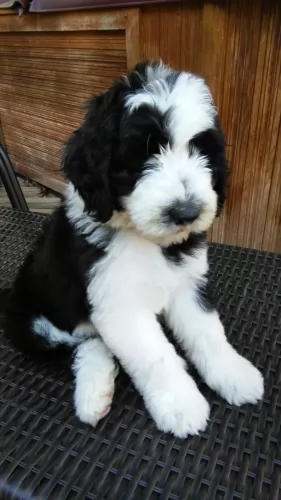 The Mini Sheepadoodle, a mix between the Mini Poodle and Sheepdog stands at between 48 and 52cm and weighs between 11 to 20kg.
The Mini Sheepadoodle, a mix between the Mini Poodle and Sheepdog stands at between 48 and 52cm and weighs between 11 to 20kg.
He is solidly built with a broad skull and face. The coat is usually medium length and can be either straight, wavy or curly. The coat can be quite a few colors depending on the parents. Some are brown, cream or black while others are white and grey or white and brown.
He is a low shedding dog. He has a double coat which will still need brushing. This hybrid breed has a thick coat that will need to be trimmed professionally every now and then as well. This is good for hot weather and for reducing the time it takes to groom the pet.
They’re easy-going, social dogs, loving to spend time with their human families. They are gentle and patient with children and they get on well with other pets in the home as well.
The Poodle is a very intelligent dog and because there is Poodle in the Mini Sheepadoodle, you can be sure that your dog is going to be bright too and that he will be able to be trained and socialized with ease. They’re friendly and don’t do too well as watchdogs.
 Your Australian Red Heeler needs plenty of exercise but also plenty of companionship too from his human family. He is an affectionate, playful pet but is reserved with people he doesn’t know. When socialized he is patient with children in the home but he does still have the tendency to herd them and nip at their heels. The dog builds up a strong bond with his human family, and is protective toward them, being happy to be close to his owner’s side.
Your Australian Red Heeler needs plenty of exercise but also plenty of companionship too from his human family. He is an affectionate, playful pet but is reserved with people he doesn’t know. When socialized he is patient with children in the home but he does still have the tendency to herd them and nip at their heels. The dog builds up a strong bond with his human family, and is protective toward them, being happy to be close to his owner’s side.
Red Heelers need activities and lots of room to play, and they therefore won’t adapt to apartment living. If you don’t live on a farm, don’t neglect your working dog as he will need lots of rough and tumble games and activities to keep him from boredom. Treat your Australian Red Heeler with the love, patience and kindness and you’ll bring out the very best from this active, loyal fur-friend of yours.
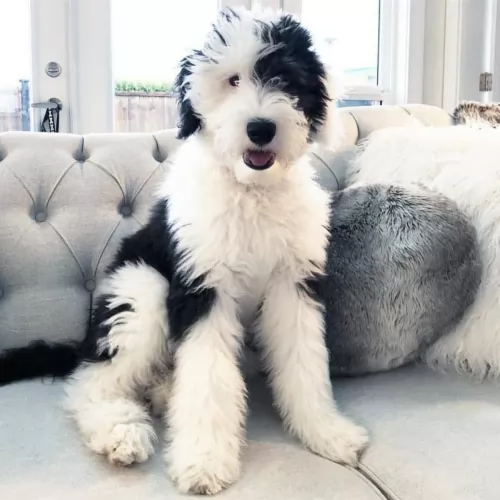 The Mini Sheepadoodle is such an affectionate teddy-bear dog and is calm, gentle and loving.
The Mini Sheepadoodle is such an affectionate teddy-bear dog and is calm, gentle and loving.
They make perfect family pets and want to please their owners. He is friendly and gets on well with his human family as well as with other pets in the home.
Children love him as he is always willing to have a game. They’re sociable and playful and make a wonderful canine pet and companion in your home.
 The Australian Cattle Dog is quite often affected by progressive retinal atrophy, an eye condition where the rods and cones in the retina of the eye deteriorate later in life, and it could lead to blindness. This eye illness is an autosomal recessive trait, and even if the dog doesn’t develop the condition himself, he can be a carrier of the affected gene.
The Australian Cattle Dog is quite often affected by progressive retinal atrophy, an eye condition where the rods and cones in the retina of the eye deteriorate later in life, and it could lead to blindness. This eye illness is an autosomal recessive trait, and even if the dog doesn’t develop the condition himself, he can be a carrier of the affected gene.
The Heeler is just bursting with personality and energy and a study of dogs diagnosed at veterinary colleges described fractures and ligament tears as one of the most common conditions treated with the Australian Red Heeler.
You love your Australian Red Heeler and you want to take good care of him. Check with your vet because at 8 weeks he should be starting with his first puppy vaccinations.
To keep your best friend healthy and happy, watch his diet, ensure he gets plenty of exercise, brush his teeth regularly to remove plaque build-up, and always call your veterinarian when you see he is ill and isn’t his usual boisterous self.
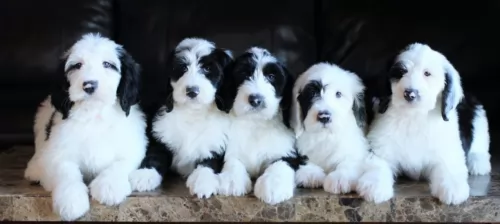 They’re healthy dogs and you’re not likely to be spending too much time at the vet. Every dog can be prone to any one of the many common dog illnesses there are. These can be hip dysplasia, obesity, bloat, dental disease, cataracts and more.
They’re healthy dogs and you’re not likely to be spending too much time at the vet. Every dog can be prone to any one of the many common dog illnesses there are. These can be hip dysplasia, obesity, bloat, dental disease, cataracts and more.
This can be a life-threatening disease and treatment will be required as soon as possible. Known also as gastric dilatation and volvulus, the stomach twists and fills with gas. The dog’s stomach becomes distended with gas, and pressure is placed on the diaphragm, creating breathing problems.
Your dog will have a swollen stomach, he’ll be drooling and panting and he’ll be restless and he may even make little whimpering noises because he is in pain. He may be trying to vomit. Your dog needs to get to the vet immediately.
This is a leading health concern with many dogs and with the Mini Sheepadoodle as well. It’s a condition where there is an abnormal formation of the hip socket. It can lead to pain and arthritis and you may even notice your once-active pet battling to do what he once did, even when he is still young.
There are things that can be done though and your vet will discuss treatment methods with you and ideas to make it comfortable for your pet.
 The Australian Red Heeler is a low maintenance dog. He does shed quite a bit so you’ll need to brush his coat at least twice a week to remove loose hairs and to keep his coat lustrous. When your dog has been in a particularly dusty area, you you wipe his coat down with a damp cloth. As with all dogs, you’ll want to check his teeth, ears, eyes and nails regularly to avoid health problems.
The Australian Red Heeler is a low maintenance dog. He does shed quite a bit so you’ll need to brush his coat at least twice a week to remove loose hairs and to keep his coat lustrous. When your dog has been in a particularly dusty area, you you wipe his coat down with a damp cloth. As with all dogs, you’ll want to check his teeth, ears, eyes and nails regularly to avoid health problems.
If you care for your working- and herding dog you’ll train him to that he becomes a good family dog and companion. The Red Heeler has plenty of energy and stamina and if he grows up untrained and un-socialized, you could see him becoming aggressive towards other animals and even your own children. He certainly becomes over-protective of his territory if not socialized. Train him as he is an intelligent breed and responds well to training.
Any vet will tell you of the critical importance of a proper diet and exercise routine for your dog. He’s an active, smart dog with loads of energy and you want to keep his diet consistent with this energy. Speak to your vet about what food would suit your pet best, because a high quality diet appropriate to his age, his body size and his energy levels will be important. Along with high quality foods which include a good intake of raw meat, your dog must always have access to a bowl of fresh, cool water.
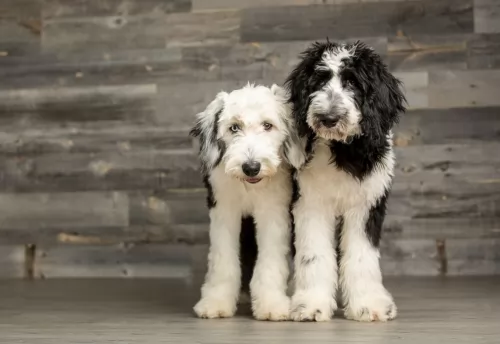 The Mini Sheepadoodles will need quite a lot of exercise as he is an active dog. Walks are always a super idea, and hikes even better. He will love other forms of activities such as ball games, hide and seek, ropes games and general rough and tumble games.
The Mini Sheepadoodles will need quite a lot of exercise as he is an active dog. Walks are always a super idea, and hikes even better. He will love other forms of activities such as ball games, hide and seek, ropes games and general rough and tumble games.
A brush every other day will be required. You can have your pet professionally trimmed. Check him over during brushing for unusual lumps. Check inside his ears and inside his mouth as he can’t tell you about ear infections or a bad tooth causing him a lot of pain.
Provide your wonderful dog with the best food there is. Just like human beings, food plays an important role in good health. Learn to read the labels on commercially manufactured dog foods and try to feed your pet natural, wholesome foods with vitamins and minerals.
Some of the more inferior brands pump their foods full of colorants and preservatives. Try and provide your Mini Sheepadoodle with some home-made food which is simple and free of spices. Things like boiled chicken, brown rice and vegetables chopped up and added to the dry kibble sometimes can do your pet a lot of good.
Make sure his vaccines are up to date and make sure you have a reliable trusted vet to turn to when he is sick.